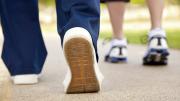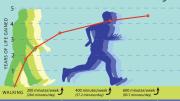For patients with high blood pressure, doctors are likely to prescribe antihypertensive medication and provide detailed instructions about how much to take, and when. They have been less able to provide detailed dosage recommendations for exercise. Research shows that a regular walking, swimming, or tennis habit reduces chronic disease risk, but it’s been unclear just how much different levels of exercise might extend our lives. Now, a study coauthored by epidemiologist I-Min Lee, a professor of medicine at Harvard Medical School and professor of epidemiology at Harvard School of Public Health, offers specific exercise prescriptions.
Lee and her colleagues pooled data from six large studies that included information on the leisure activities and body mass index of more than 650,000 people older than 40, each of whom was followed for an average of 10 years. The researchers’ analysis revealed that subjects who completed the equivalent of 75 minutes of brisk walking each week—roughly 11 minutes a day—lived 1.8 years longer than those who didn’t exercise at all. Those who got the federally recommended minimum of 150 minutes of moderate-intensity exercise a week—22 minutes every day, or 30 minutes a day, five days a week—gained 3.4 years.
Lee was somewhat surprised that even small amounts of movement made such a difference. “What we found is really encouraging,” she says. “If you do a little, you get a fairly good gain in years.”
That’s promising news, given that more than half of all Americans don’t meet those federal physical-activity guidelines. “It’s very daunting for someone who never does physical activity even to think of 150 minutes a week,” Lee says. “This research suggests that while 150 minutes is a target, we can ask people to start off slowly and work their way up. Doing something is better than doing nothing.” The more people exercised, the more years they gained, Lee says, although the benefits begin to plateau at about 43 minutes of brisk walking a day.
The gains applied to people of all weight levels, even those who were obese, “suggesting that even if you don’t lose weight, you’re better off than you were when you were not exercising,” Lee says. Still, normal-weight people who completed the recommended 150 minutes of moderate intensity exercise each week fared best, living more than seven years longer than those who didn’t exercise and had the highest body mass index.
Researchers used brisk walking as an example because it’s the most commonly reported form of exercise, but any moderate-intensity activity will do: yard work, a bike ride, romping with kids. The only requirement, Lee says, is raising the heart rate to the point that you can carry on a conversation but “you can’t sing because you don’t have enough breath.” She adds that people who engaged in more vigorous exercise, say running or playing squash, experienced the same gains as moderate exercisers, but in about half the time each week. (The federal recommendation for vigorous exercise is 75 minutes per week.)
Most people acknowledge that they should exercise, but Lee believes it’s time to promote inactivity as a health risk akin to smoking, now universally accepted as a dangerous choice. “We recently finished a study [published in The Lancet] that suggests that the number of lives lost from being inactive is as great as the lives lost from smoking,” she says.
Lee herself runs 15 to 20 miles a week, and does as many errands as possible on foot, but admits, “I never used to exercise.” When she began physical-activity research as a graduate student, though, “It was very hypocritical to do the research and not be physically active. So I’m one of those that converted.”









